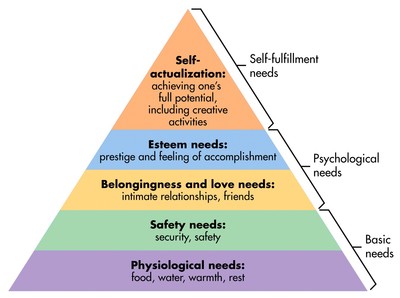what are your goals?
masen, 17 November 2012
 A question that often comes up in my line of personal study is "Why do
people do what they do?" It's an admittedly broad question because
there are many layers of decision making that go on within our minds
that dictate our behavior. There is no simple 'why' which explains any
action; in my experience the more i try to drill down into the 'primary
why', the other whys become more prominent. Things don't line up.
Further who am I to suggest that I can answer the question for other
people? To pursue the topic, I'll have to self-examine my behavior,
although that could be biased and unreliable as well. Then to make any
promising generalizations, I'll need vaguely assume that my analysis
is general enough to apply to others.
A question that often comes up in my line of personal study is "Why do
people do what they do?" It's an admittedly broad question because
there are many layers of decision making that go on within our minds
that dictate our behavior. There is no simple 'why' which explains any
action; in my experience the more i try to drill down into the 'primary
why', the other whys become more prominent. Things don't line up.
Further who am I to suggest that I can answer the question for other
people? To pursue the topic, I'll have to self-examine my behavior,
although that could be biased and unreliable as well. Then to make any
promising generalizations, I'll need vaguely assume that my analysis
is general enough to apply to others.
Simplifying the problem is usually a good place to start. Let's consider that each action I take is designed in my brain to influence my environment in a way consistent with my model of the world. This implies that:
- I choose my actions
- Those decisions are based on my understanding of the world.
- I have some preference in regard to my environment
At a fundamental level, these behavioral choices come down to taking the difference between desired situation and current situation, then applying deductive or dialectic logic (based on my understanding of the world) to determine a set of actions which should transition my situation to my desired situation. All decisions that I make are based on this simple principal. Based on my observations of others, I can safely assume that the behavior of others is based in this process as well.
This process seems so rational, yet we see people acting irrationally all around us. A key point to take away is that the reasoning is based on "my understanding of the world". That's quite a whopper of a condition, and is the first hole through which complexity pours. If everyone shared a common and accurate world view, we should expect then to observe only 'rational' behavior; this is not the case. For instance, I was always told as a kid, "don't talk to strangers". Sound advice, I suppose. But consider that repeating mantras like this in childhood can influence how we understand trust. By "other-izing" the strangers, suddenly their wellbeing does not factor into my decision making process as an adult. Though I may talk to them now, the stigma of avoiding outsiders is still stamped in my psyche. I will act in a way consistent with my understanding of the world. This can be extrapolated in almost any direction.
 The second spigot of complexity is where this "desired situation"
comes from? To explain this, I'll fall back to Abraham Maslow's
Hierarchy of Needs. Maslow's hierarchy is represented as a pyramid
divided into horizontal bands which represent human needs. Starting from
the bottom, each level of the pyramid is dependent on the previous
levels. In other words, you can't expect to have high level needs met
while more fundamental needs like food and shelter are unmet.
The second spigot of complexity is where this "desired situation"
comes from? To explain this, I'll fall back to Abraham Maslow's
Hierarchy of Needs. Maslow's hierarchy is represented as a pyramid
divided into horizontal bands which represent human needs. Starting from
the bottom, each level of the pyramid is dependent on the previous
levels. In other words, you can't expect to have high level needs met
while more fundamental needs like food and shelter are unmet.
Great, so there are these human needs which represent broad separations in behavior. Nearly all actions taken can be analyzed under this lens to determine at what level the premonition of the action originated. For example, if I decide to volunteer at a soup kitchen this could be based out of Belonging needs: trying to fit in with a group labeled "progressive volunteers"; or it could be based out of transcendence: genuinely reaching out to assist other people for no other reason than they could use some food. The specific action (volunteering at a soup kitchen) is more likely related to my past experiences and beliefs, however where on the pyramid the action originates from is related to my current situation and how my various needs are being met in my life. Both factors are important for deciding on behavior.
 Therefore, I'll claim that "desired situation" arises out of a
difference between how your needs are currently being met and how you
could see your needs being met based on past experiences and beliefs.
Further, the specific action that you take is based on your
understanding of the world and how you believe the world can be
changed. Obviously, this is a high-level viewpoint, but helps us to at
least frame the question. There are many layers which have been glossed
over here, such as how beliefs and experiences are formed and how they
shape you, as well as how we become conditioned to expect action -->
response chains.
Therefore, I'll claim that "desired situation" arises out of a
difference between how your needs are currently being met and how you
could see your needs being met based on past experiences and beliefs.
Further, the specific action that you take is based on your
understanding of the world and how you believe the world can be
changed. Obviously, this is a high-level viewpoint, but helps us to at
least frame the question. There are many layers which have been glossed
over here, such as how beliefs and experiences are formed and how they
shape you, as well as how we become conditioned to expect action -->
response chains.
So how can this information be used to enlighten your behavior? Well it's important to be AWARE of where you stand on the hierarchy of needs. If you are aware of the state of your needs, you'll better understand why it makes sense to vandalize a bathroom stall (perhaps because it invokes a feeling of ownership or belonging to a larger group) or casually shut down ideas in a staff meeting at work (Because your ideas were not well received, others' shouldn't be either). These situations and outcomes may be considered 'desired', but are far from 'enlightened'. Being aware of the "why?" is the first step to changing behavior.
The next most important thing is being willing to adapt your world view in a scientific way -- based on what is observed to work and not work. False or weak assumptions about the world are likely decrease the effectiveness of actions in achieving your desired situation.
So Why does anyone do what they do? Because that's what they do. Essentially, I've found the issue to be so complex, that breaking it down further can yield some insight, but does not adequately answer the question. More research is needed.